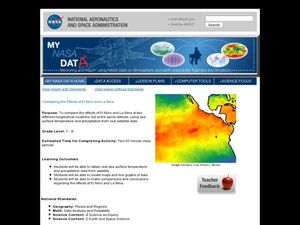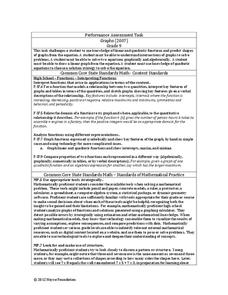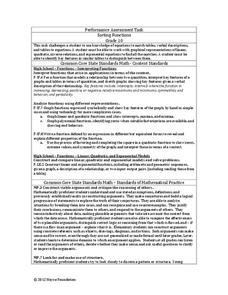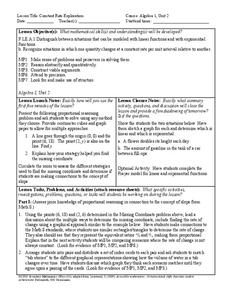Curated OER
Unit III: Worksheet 4 - Uniform Acceleration
Eight problems require general physics recruits to calculate acceleration or distance traveled. They read the situations involving cars and buses, running bears, downhill skiers, and a rock slide and then get to work. Provide this as a...
It's About Time
Concentrating on Collisions
How important is momentum? Pupils investigate and apply the definition of momentum as they conduct analyses during a series of one-dimensional collisions. They infer the relative masses of two objects by carefully staging and predicting...
EngageNY
Graphing the Sine and Cosine Functions
Doing is more effective than watching. Learners use spaghetti to discover the relationship between the unit circle and the graph of the sine and cosine functions. As they measure lengths on the unit circle and transfer them to a...
EngageNY
Constant Rate
Two-variable equations can express a constant rate situation. The lesson presents several constant rate problems. Pupils use the stated constant rate to create a linear equation, find values in a table, and graph the points. The resource...
EngageNY
Increasing and Decreasing Functions 2
Explore linear and nonlinear models to help your class build their function skills. In a continuation of the previous lesson, learners continue to analyze and sketch functions that model real-world situations. They progress from linear...
Curated OER
Graphical Analysis
Get out your TI-nspire graphing calculator and explore polynomials. Learners determine where a given polynomial are increasing or decreasing, find maximums, minimums, and zeros of polynomials, and discuss end behavior of polynomials....
Worksheet Web
Burrowing Animals – Ground Squirrels
Why do ground squirrels build their homes in the ground? What's so unique about these burrows? Have individuals read about this burrowing animal, and then respond to five short answer questions that assess their comprehension of the...
Curated OER
Water Fitness
Toward the end of the school year when the weather warms up, take your high schoolers swimming! They perform various cardiovascular activities in the pool, beginning with a warm-up activity and followed by stretching, precardio,...
Curated OER
Waves
Light waves and sound waves are the focus of this science lesson designed for 5th graders. Besides discovering how these waves travel, learners also discover the basic properties of waves, and analyze data tables and graphs. The...
Curated OER
Worksheet 14: Properties of Logs
In this math worksheet, students are given 7 problems in which they review properties of logs and solve, differentiate formulae, find derivatives and solve story problems involving the rate of spread of a disease and Newton's Law of...
Curated OER
Histograms
Young statisticians explore the concept of histograms. They construct histograms of various data such as change in a student's pocket, and guessing on a test. hHey analyze data represented as a histogram and a box plot and compare...
Curated OER
Inquiry Unit: Modeling Maximums and Minimums
Young mathematicians explore the maximun area for patio with the added complexity of finding the mimimum cost for construction. First, they maximize the area of a yard given a limited amount of fence and plot width v. area on a...
Curated OER
Comparing the Effects of El Nino and La Nina
Students examine the differences between an El Nino and La Nina year. In this investigative lesson plan students create maps and graphs of the data they obtained.
All Things PLC
Critical Issues for Team Consideration
Profession Development Community (PLC) teams use the provided worksheet to evaluate the progress of their group in addressing critical issues their school is facing.
EngageNY
Why Do Banks Pay YOU to Provide Their Services?
How does a bank make money? That is the question at the based of a lesson that explores the methods banks use to calculate interest. Groups compare the linear simple interest pattern with the exponential compound interest pattern.
Inside Mathematics
Graphs (2007)
Challenge the class to utilize their knowledge of linear and quadratic functions to determine the intersection of the parent quadratic graph and linear proportional graphs. Using the pattern for the solutions, individuals develop a...
Inside Mathematics
Sorting Functions
Graph A goes with equation C, but table B. The short assessment task requires class members to match graphs with their corresponding tables, equations, and verbalized rules. Pupils then provide explanations on the process they used to...
Curated OER
It's Freezing!
Here is a good activity for 5th grade scientists. In it, they look at a bar graph that shows the freezing point for a variety of liquids. Then, they are given a scenario of a certain liquid melting and freezing, and must determine which...
Institute of Electrical and Electronics Engineers
Arduino Blink Challenge
Emerging engineers read about Arduino software and how it can be used. Then they follow a nine-step tutorial to connect an Arduino board to a computer and put it to work! The objective is to code a program that will cause an LED to...
Fun Music Company
The Harmonic Minor Scale
The harmonic minor scale, including the use of accidentals, is the focus of a one-page instructional activity that includes instructional information and practice exercises.
NOAA
El Niño
El Nino, La Nina ... and the Santa Maria? The 11th installment of a 23-part NOAA Enrichment in Marine sciences and Oceanography (NEMO) program explains the mechanism of El Nino/Southern Oscillation. Pupils use previous data to determine...
West Contra Costa Unified School District
Indefinite Integrals
The inverse of matter is anti-matter, so the inverse of a derivative is an antiderivative. The lesson introduces antiderivatives and indefinite integrals to the class along with the notation for integrals. Groups work together to find...
Howard County Schools
Constant Rate Exploration
Question: What do rectangles and bathtub volume have in common? Answer: Linear equations. Learn how to identify situations that have constant rates by examining two different situations, one proportional and one not proportional.
Curated OER
An Enzyme- Substrate Model
Students explore reaction rates of an enzyme-mediated reaction. They examine the effects of environmental variables on enzyme function. Students collect, graph, and analyze data relating to the reaction.
Other popular searches
- Time Intervals
- Time 5 Minute Intervals
- Tell Time 1 Hour Intervals
- Time Intervals in Math
- Math Time Intervals
- Telling Time Intervals
- Time in 5 Minute Intervals
- One Minute Interval
- Time Intervals Lesson Plans























